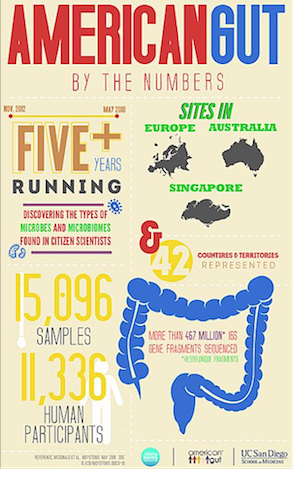Macro Data for the Microbiome
The American Gut Project has inspired more than 10,000 people to mail fecal samples to UC San Diego. That's a good thing.

The Human Genome Project was considered a foundational scientific event. The National Institutes of Health-funded program took more than a decade and helped shape human understanding of genomics, paving the way for a field’s worth of research
A person’s gut might not seem as techy or appealing as their genome, but just like their unique DNA, there’s a ton of personal and medically-relevant information contained there. And like genomics, the full scope of the gut microbiome’s implications are yet to be fully understood.
Enter the American Gut Project.
Launched in 2012 by researchers at University of California San Diego, the American Gut Project is looking to gain a deeper understanding of the sorts of insights stored in the gut flora through a massive public database. Participants send the researchers a fecal, oral, or skin swab along with $99 and a lifestyle/medical history survey. So far the initiative has collected over samples from nearly 12,000 people, making it the “largest public reference database of the human gut microbiome.”
"It's really amazing that more than 10,000 people—members of the public who want to get involved in science whether or not they work in a lab or have a PhD—have mailed their poop to our lab so that we can find out what makes a difference in somebody's microbiome," Rob Knight, PhD, said of the American Gut Project’s success so far.
>>READ: Defining "Normal" in the Age of Precision Medicine
The goal isn’t to diagnose participants with anything or find indicators for future health worries, but rather to deepen science’s collective understanding of the microbiome and facilitate future research. The researchers use a bacteria marker, the molecule 16S rRNA, to “tease out” and “barcode” the unique composition of each participant’s sample.
This week, the team published its first report from its findings. It generated a number of interesting points: The amount of floral diversity between people who reported eating 30 or more different plants per week compared to that of those who ate less than 10; the extent to which antibiotics or medical procedures can alter gut microbiome; and the surprising correlations it can have with mental health.
Although participants come from nearly 50 countries and territories, the samples draw primarily from the United States, United Kingdom, and Australia. The report found that those with mental disorders, for instance, had gut microbiomes more closely resembling those with other mental disorders than they did with healthy pairs matched by country, age, gender, and body mass index.
The researchers warn that it’s too early to start extrapolating gut microbiome findings into definitive health lessons. "The human microbiome is complex, but the more samples we get, the sooner we will be able to unravel the many ways the microbiome is associated with various health and disease states," Knight said. “We want eventually to go beyond making maps of the microbiome to making a microbiome GPS that tells you not just where you are on that map, but where you want to go and what to do in order to get there in terms of diet, lifestyle or medications."
To date, the project has received more than $2.5 million in total crowdfunding. The first research report, “American Gut: an Open Platform for Citizen Science Microbiome Research,” was published online today in mSystems.
Related Coverage:
How a New $300M Precision Medicine Fund Aims to Use AI, IoT
Microsoft and Foresite Capital Contribute to DNANexus's $58M Funding Round
Big Data, Analytics Ready to Meet Health Care Challenges
Newsletter
Get the latest hospital leadership news and strategies with Chief Healthcare Executive, delivering expert insights on policy, innovation, and executive decision-making.